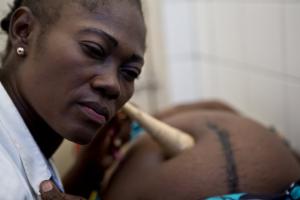African health ministers agree on priority actions towards implementation of the Global Strategy for Women’s, Children’s and Adolescents’ Health 2016–2030
Addis Ababa, 20 August 2016 – Ministers of Health of the 47 countries in the African Region agreed on priority actions to step up actions towards implementation of the Global Strategy for Women’s, Children’s and Adolescents’ Health 2016–2030 during the 66th session of the World Health Organization (WHO) Regional Committee for Africa. The Ministers committed to ensure the implementation of the Strategy in line with the Sustainable Development Goals along each country’s health development plan and goals.
The Global Strategy envisions that by 2030, every woman, child and adolescent in every setting realizes their rights to physical and mental health and well-being, has social and economic opportunities, and is able to participate fully in shaping prosperous and sustainable societies.
Highlighting the strategy’s all-rounded approach to ensuring women’s, children’s and adolescent’s health, Dr Matshidiso Moeti, WHO Regional Director for Africa, said, “This strategy aims to ensure that women, children and adolescents not only stay alive but also thrive and live transformed lives free of extreme poverty and other disabling situations. Implementing it requires going beyond the traditional approach and reaching out to tackle communicable and non-communicable diseases as well.” She added, “The Global Strategy provides an opportunity to countries to back with action previous commitments and resolutions and step up towards meeting the Sustainable Development Goals (SDGs). It is imperative that Member States move to action and build strong partnerships across and within sectors.”
Despite considerable reduction of maternal and child deaths in the African Region between 1990 and 2015, only 12 countries achieved the Millennium Development Goals (MDGs) target on reduction of child deaths, and only two countries achieved the target on reduction of maternal deaths, while no country achieved the targets on reproductive health. This means that many mothers and children continue to die from preventable causes in several African countries.
The Global Strategy focuses on some areas that were previously neglected, including adolescents’ health, equity and universality. It also applies a multisectoral approach, working with core sectors such as nutrition, education, and water and sanitation. It calls on government to focus on the most vulnerable, leaving no-one behind, with an explicit focus on humanitarian settings.
The Global Strategy calls for government ownership and leadership of programmes and initiatives, including ensuring that women’s, children’s and adolescents’ issues are prioritized in national development and political agendas. Enabling policies, resource mobilization, and participatory and transparent planning are also highlighted as mandatory in the Strategy along with putting in place accountability processes for monitoring of progress towards agreed national targets.
The Regional Committee agreed, among others, to ensure government ownership and leadership of programmes including implementation of enabling policies and mobilization of adequate resources, institute measures for health systems strengthening; develop accountability frameworks; ensure wide coverage of reproductive health; maternal, newborn, child and adolescent health interventions; and work towards integrated systems for successful implementation of the Global Strategy as part and parcel of the SDGs.
____________________________
For more information, please contact:
Dr Felicitas Zawaira, Director of Family and Reproductive Health Cluster, WHO AFRO; Tel: +242 065 104 614; Email: zawairaf [at] who.int (zawairaf[at]who[dot]int)
Loza Mesfin Tesfaye, Communications Officer, WHO AFRO; Tel: +251 911 144 194; Email: tesfayel [at] who.int (tesfayel[at]who[dot]int)
Collins Boakye-Agyemang, Regional Communications Adviser, WHO AFRO; Tel: + 242 06 520 6565; Email: boakyeagyemangc [at] who.int (boakyeagyemangc[at]who[dot]int)
Fabienne Aboua, Communications Officer, WHO AFRO; Email: abouaf [at] who.int (abouaf[at]who[dot]int)
Pieter Desloovere, Communications Consultant, WHO AFRO; Email: deslooverep [at] who.int (deslooverep[at]who[dot]int)



